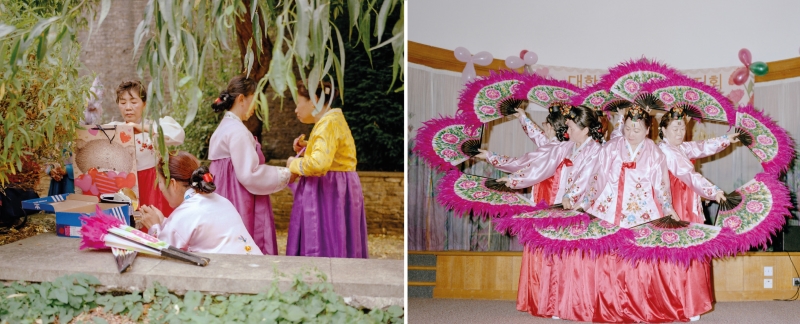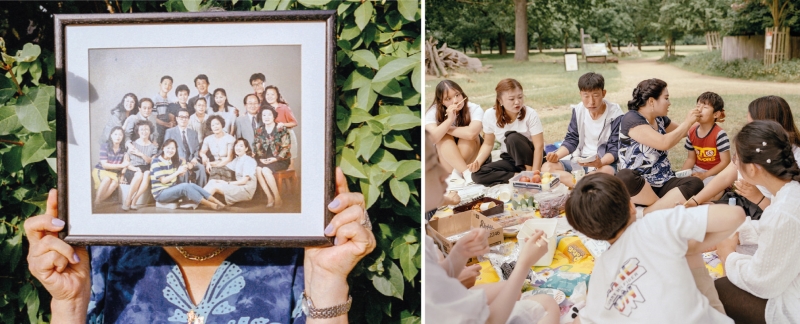- 한국어
- English
- 日本語
- 中文
- العربية
- Español
- Français
- Deutsch
- Pусский
- Tiếng Việt
- Indonesian
By Honorary Reporter Foteini Chatzoudi from Greece
Photos = Kim Chan-yang
In London, New Malden in the Royal Borough of Kingston upon Thames is home to one of Europe's largest ethnic Korean communities. The Korean diaspora here has made a substantial impact through stores, restaurants, businesses and cultural establishments. King Charles III visited New Malden on Nov. 8, 2023, to greet President Yoon Suk Yeol, who making a state visit to the U.K. at the time, to honor Korean culture.
I discovered New Malden through Korean British photographer Kim Chan-yang's "Dongpo," a photographic collection capturing Korean expats in the area. His work has been displayed at Bienal '23 Fotografia do Porto (Biennial of Photography of Porto) in Portugal and the Victoria and Albert Museum in London and in publications like the British Journal of Photography.
The following are excerpts from an email interview with him from Jan. 5-17.
Introduce yourself and explain why you pursued photography.
I'm a Korean Briton born in Seoul but raised in Manchester, England. While doing my bachelor's in zoology, particularly the module "Biological Photography and Imaging," I researched photography and came across the exhibition "British Documentary Photographers." I grew enamored with this so I studied for a master's in documentary photography from the University of South Wales. After graduating and returning to Manchester, I started snapping shots of my area, community, friends and strangers.

Women wear Hanbok for a festival (left) and a troupe performs the traditional fan dance buchaechum (right).
How did you learn about New Malden's Koreatown?
After taking pictures in Manchester for several years, I wanted to take my practice to a different level. I was doing research for my master's and had to devise a new project. While studying Koreans globally, I discovered that New Malden is the epicenter for Koreans in the U.K. My curiosity was piqued.
Why did you start the project "Dongpo?"
I wanted to document and immerse myself in the ethnic Korean community and after starting my master's, I moved to London to be closer to the area. On a global scale, Korean culture has experienced a significant surge and continues to do so, covering genres like K-pop, film, TV shows and food. But my aim was to also represent the (relatively) small diaspora in the U.K. and how Korean culture has integrated.
What does your project's name mean?
In Korean, dongpo means "brethren" or "people of the same ancestry." This term has a transcendental and transnational quality that embraces the Korean diaspora, stressing links among Koreans around the globe.
What message do you wish to convey through your photos?
Whenever a culture is transposed to a country where it didn't originate from, people tend to take things as a remembrance or do things in a ritualistic sense. This can be a way to pay tribute to their origins, homeland and identity that have been separated from their birthplace and upbringing. I want to show these things and the people and families who have moved.
New Malden has many refugees from North Korea as well as people from South Korea, but everyone looks like they live together peacefully (though I'm sure the place has its own unique problems like any society). This shows that Koreans have a long history together, complex as it may be, and only recently were they separated due to events outside their control.

New Malden has one of the biggest Koreatowns in Europe.
What explains the nostalgic feel in your photos?
The warmth and nostalgic feelings in my images are a definitive reflection of how I felt walking into a new community and being welcomed. I was instantly befriended and everyone was nice. My images reflect that. A lot of them that I've always taken, especially in Manchester, evoke a feeling of being in a community, a large family with loyal friends. I also only take photos using analog film, which helps create a vintage and nostalgic feeling.
What did you gain from this project?
My Korean improves a bit every time I go to New Malden and I've met amazing people. My study of history between Korea and the U.K. has also helped me understand my own identity and place in the world.
What are your upcoming projects?
My focus is on completing this project and seeking both a publisher and an exhibition to showcase it. Over the long term, I hope to go to Korea and take pictures of my extended family.
I'm also researching and visiting ethnic Korean communities around the world. Beginning with Europe, I want to show the threads and branches of the larger diasporic tree of what it means to be Korean today.
jihlee08@korea.kr
*This article is written by a Korea.net Honorary Reporter. Our group of Honorary Reporters are from all around the world, and they share with Korea.net their love and passion for all things Korean.